英语反义疑问句讲解及练习题 2
反义疑问句的讲解及练习(含答案)
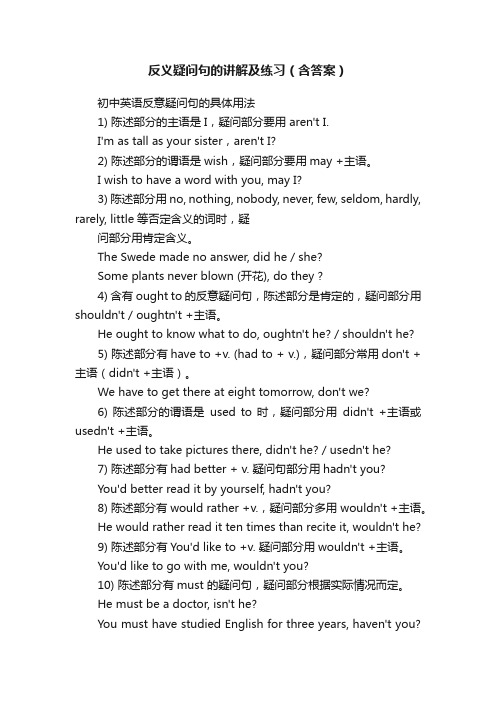
反义疑问句的讲解及练习(含答案)初中英语反意疑问句的具体用法1) 陈述部分的主语是I,疑问部分要用 aren't I.I'm as tall as your sister,aren't I?2) 陈述部分的谓语是wish,疑问部分要用may +主语。
I wish to have a word with you, may I?3) 陈述部分用 no, nothing, nobody, never, few, seldom, hardly, rarely, little等否定含义的词时,疑问部分用肯定含义。
The Swede made no answer, did he / she?Some plants never blown (开花), do they ?4) 含有ought to 的反意疑问句,陈述部分是肯定的,疑问部分用shouldn't / oughtn't +主语。
He ought to know what to do, oughtn't he? / shouldn't he?5) 陈述部分有have to +v. (had to + v.),疑问部分常用don't +主语(didn't +主语)。
We have to get there at eight tomorrow, don't we?6) 陈述部分的谓语是used to 时,疑问部分用didn't +主语或usedn't +主语。
He used to take pictures there, didn't he? / usedn't he?7) 陈述部分有had better + v. 疑问句部分用hadn't you?You'd better read it by yourself, hadn't you?8) 陈述部分有would rather +v.,疑问部分多用 wouldn't +主语。
中考英语反义疑问句、感叹句讲解及习题
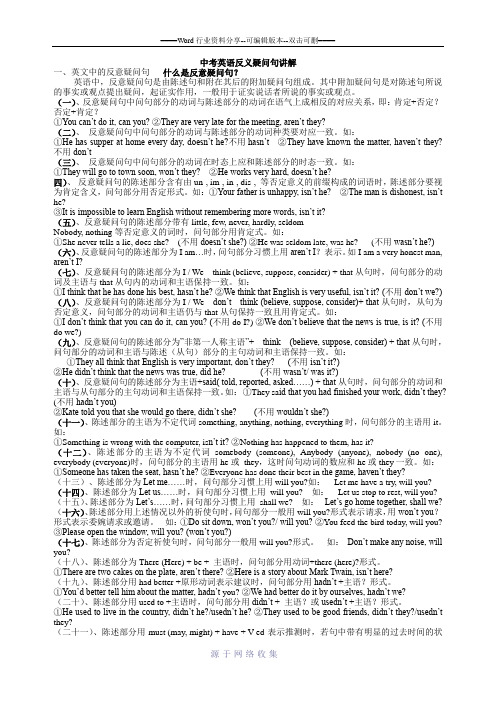
中考英语反义疑问句讲解一、英文中的反意疑问句什么是反意疑问句?英语中,反意疑问句是由陈述句和附在其后的附加疑问句组成。
其中附加疑问句是对陈述句所说的事实或观点提出疑问,起证实作用,一般用于证实说话者所说的事实或观点。
(一)、反意疑问句中问句部分的动词与陈述部分的动词在语气上成相反的对应关系,即:肯定+否定?否定+肯定?①You can’t do it, can you? ②They are very late for the meeting, aren’t they?(二)、反意疑问句中问句部分的动词与陈述部分的动词种类要对应一致。
如:①He has supper at home every day, doesn’t he?不用hasn’t②They have known the matter, haven’t they?不用don’t(三)、反意疑问句中问句部分的动词在时态上应和陈述部分的时态一致。
如:①They will go to town soon, won’t they? ②He works very hard, doesn’t he?四)、反意疑问句的陈述部分含有由un-, im-, in-, dis-, 等否定意义的前缀构成的词语时,陈述部分要视为肯定含义,问句部分用否定形式。
如:①Your father is unhappy, isn’t he? ②The man is dishonest, isn’t he?③It is impossible to learn English without remembering more words, isn’t it?(五)、反意疑问句的陈述部分带有little, few, never, hardly, seldomNobody, nothing等否定意义的词时,问句部分用肯定式。
如:①She never tells a lie, does she? (不用doesn’t she?)②He was seldom late, was he? (不用wasn’t he?) (六)、反意疑问句的陈述部分为I am…时,问句部分习惯上用aren’t I?表示。
反义疑问句练习题及答案解析

反义疑问句练习题及答案解析反义疑问句是英语语法中的一种问句形式,用于在表达某种观点或态度时,征求对方的认同或否认。
反义疑问句通常由两个部分组成,主句和从句,其中主句陈述事实,并以逗号结尾,从句是对主句的反问。
以下是一些反义疑问句的练题及答案解析:1. He is a doctor, isn't he?答案:是解析:句子的主语是 "He",陈述了 "He" 是一个医生。
主句以逗号结尾,从句表达了 "He" 是一个医生这一观点,并征求对方的认同。
2. They don't like coffee, do they?答案:否解析:句子的主语是 "They",陈述了 "They" 不喜欢咖啡。
主句以逗号结尾,从句表达了 "They" 不喜欢咖啡这一观点,并征求对方的否认。
3. You can swim, can't you?答案:是解析:句子的主语是 "You",陈述了 "You" 能游泳。
主句以逗号结尾,从句表达了 "You" 能游泳这一观点,并征求对方的认同。
4. She hasn't finished her homework, has she?答案:否解析:句子的主语是"She",陈述了"She" 没有完成她的作业。
主句以逗号结尾,从句表达了 "She" 没有完成她的作业这一观点,并征求对方的否认。
5. He won't be late, will he?答案:否解析:句子的主语是 "He",陈述了 "He" 不会迟到。
主句以逗号结尾,从句表达了"He" 不会迟到这一观点,并征求对方的否认。
反义疑问句详细讲解及习题及答案-反意疑问句-反义疑问句题目及答案解析
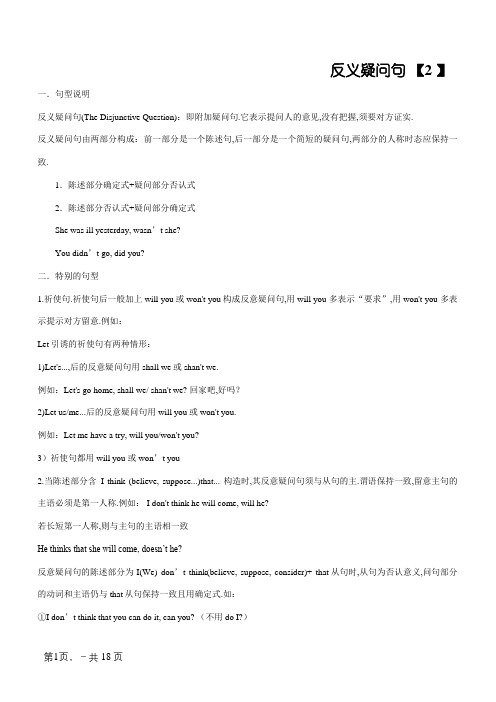
反义疑问句【2 】一.句型说明反义疑问句(The Disjunctive Question):即附加疑问句.它表示提问人的意见,没有把握,须要对方证实.反义疑问句由两部分构成:前一部分是一个陈述句,后一部分是一个简短的疑问句,两部分的人称时态应保持一致.1.陈述部分确定式+疑问部分否认式2.陈述部分否认式+疑问部分确定式She was ill yesterday, wasn’t she?You didn’t go, did you?二.特别的句型1.祈使句.祈使句后一般加上will you或won't you构成反意疑问句,用will you 多表示“要求”,用won't you 多表示提示对方留意.例如:Let引诱的祈使句有两种情形:1)Let's...,后的反意疑问句用shall we或shan't we.例如:Let's go home, shall we/ shan't we? 回家吧,好吗?2)Let us/me...后的反意疑问句用will you或won't you.例如:Let me have a try, will you/won't you?3)祈使句都用will you 或won’t you2.当陈述部分含I think (believe, suppose...)that... 构造时,其反意疑问句须与从句的主.谓语保持一致,留意主句的主语必须是第一人称.例如: I don't think he will come, will he?若长短第一人称,则与主句的主语相一致He thinks that she will come, doesn’t he?反意疑问句的陈述部分为I(We) don’t think(believe, suppose, consider)+ that从句时,从句为否认意义,问句部分的动词和主语仍与that从句保持一致且用确定式.如:①I don’t think that you can do it, can you? (不用do I?)②We don’t believe that the news is true, is it? (不用do we?)反意疑问句的陈述部分为主语+said( told, reported, asked……) + that从句时,问句部分的动词和主语与陈述部分的主句动词和主语保持一致.如:①They said that you had finished your work, didn’t they? (不用hadn’t you)②Kate told you that she would go there, didn’t she? (不用wouldn’t she?)3.当反意疑问句的陈述部分为从句时,若主句主语为I ,反意部分的主语为从句主语;若不为I ,反义部分的主语为主句主语.①I know your father is a worker, isn't he?①she knows your father is a worker, doesn’t she?4.当陈述部分含有以下这些含有否认意义的词时:few, little, seldom,hardly, never, not, no, no one, nobody, nothing, none, neither等,其反意疑问句需用确定构造.例如: He is never late for school, is he?5.当陈述部分所含的否认词是经由过程加前缀或后缀构成的,厥后的反意疑问句依旧用否认构造.例如:It is unfair, isn't it? 这不公正,是吧?6.陈述部分主.谓语是I am...时,反意疑问句用aren't I ,而不是am not I (可用am I not).例如:I'm working now, aren't I? 我在工作,是吗?7. 陈述部分的主语是 everybody, everyone, anybody, anyone, somebody, someone, nobody, no one, none, neither 时, 其反意疑问句的主语需用复数代词they.例如:Everyone is here, aren't they? 大家都到了,是吗?No one knows about it, do they? 没有人知道这件事,对吗?8.陈述部分的主语是everything, nothing, anything或something 时,反意疑问句的主语运用代词it.例如:Something is wrong with my radio, isn't it?我的收音机出缺点了,是吧?9.陈述部分的主语是指导代词this或that时,反意疑问句的主语用it,当陈述部分的主语是指导代词these或those 时,其反意疑问句的主语用they.例如:This is a plane, isn't it? 这是一架飞机,是吗?These are grapes,aren't they? 这些是葡萄,是吗?10.陈述部分的主语是不定代词one时,反意疑问句的主语可以用one,也可用you.例如:One should be ready to help others, shouldn't one?每小我都应当乐于助人,是吧?11. 当陈述部分谓语动词是need, dare,且这些词被用作实义动词时,其反意疑问句需用do的恰当情势.例如:He needs help, doesn't he?他须要关心,是吗?12.当陈述部分主语是从句.不定式(短语).动词-ing情势时,反意疑问句的主语应当用it.例如:What you need is more important, isn't it?你须要的器械更主要,是吧?12.have(has)不是表示“有”的意思,并在句中做谓语时,其反意疑问句的助动词要用do, does, did.例如:They had a meeting just now,didn't they?他们适才开了个会,是吗?15.陈述部分有have to 时,其反意疑问句要用助动词的否认情势.例如:You have to water the vegetables every day, don't you?You had to water the vegetables every day, didn't you?16.He used to stay up late, usedn’t he/ didn’t he?17.陈述部分是there be句型时,其反意疑问句中要用there.There was a hospital here, wasn't there?18.陈述部分有had better时,反意疑问句中要用hadn't.例如:We’d better go to school at once, hadn't we?He’d rather go home, wouldn’t he?19.当陈述部分含有情态动词must时,我们便要剖析一下must的寄义.假如must 作“必定;要;必须”讲,反意疑问句须用mustn't或needn't;而当must作推想意义“必定是;必定”讲时,反意疑问句则需依据must后的动词本相选用响应的情势.例如: He must work hard at physics, mustn't he?他必须尽力学物理,是吧?Tom must be at home,isn't he? 汤姆必定在家,是吧①He might have forgotten his pen in the classroom yesterday, didn’t he?(不用mightn’t he?/ hasn’t he?)②You must have got up late this morning, didn’t you?(不用mustn’t you?/haven’t you?)20.反意疑问句的答复用yes, no, 但是,答复意思相反,当陈述部分是否认情势时,答复要按事实.例如:They don’t work hard, do they?Yes, they do. 不,他们工作尽力./No, they don’t. 对, 他们工作不尽力.反意疑问句的陈述部分为I am……时,问句部分习惯上用aren’t I?表示.如:I am a very honest man, aren’t I?反意疑问句二反意疑问句是英语四大问句之一,它是由一个陈述句加上一个短问句而构成的.反意疑问句的根本构成情势是:陈述句+动词(确定或否认)+主语?如:①She often has lunch at school, doesn’t she? ②You don’t like sports, do you?一. 反意疑问句中问句部分的动词与陈述部分的动词在语气上成相反的对应关系,即:确定+否认?否认+确定?如:①You can’t do it, can you? ②They are very late for the meeting, aren’t they?二.反意疑问句中问句部分的动词与陈述部分的动词种类要对应一致.如:①He has supper at home every day, doesn’t he? (不能用hasn’t he?)②They have known the matter, haven’t they? (不能用don’t they?)三.反意疑问句中问句部分的动词在时态上应和陈述部分的时态一致.如:①They will go to town soon, won’t they?(不能用don’t they?或aren’t they?)②He works very hard, doesn’t he?(不能用didn’t he?或won’t he?)四.反意疑问句的陈述部分带有little, few, never, hardly, seldom等否认意义的词时,问句部分用确定式.如:①She never tells a lie, does she?(不用doesn’t she?)②He was seldom late, was he?(不用wasn’t he?)五.反意疑问句的陈述部分含有由un-, im-, in-, dis-, 等否认意义的前缀构成的词语时,陈述部分要视为确定寄义,问句部分用否认情势.如:①Your father is unhappy, isn’t he?(不能用is he?)②The man is dishonest, isn’t he? (不能用is he?)六.反意疑问句的陈述部分为I am……时,问句部分习惯上用aren’t I?表示.如:I am a very honest man, aren’t I?八.反意疑问句的陈述部分为I(We) don’t think(believe, suppose, consider)+ that从句时,从句为否认意义,问句部分的动词和主语仍与that从句保持一致且用确定式.如:①I don’t think that you ca n do it, can you? (不用do I?)②We don’t believe that the news is true, is it? (不用do we?)九.反意疑问句的陈述部分为非第一人称主语+ think(believe, suppose, consider) + that从句时,问句部分的动词和主语与陈述部分的主句动词和主语保持一致.如:①They all think that English is very important, don’t they? (不用isn’t it?)②He didn’t think that the news was true, did he? (不用wasn’t/ was it?)十.反意疑问句的陈述部分为主语+said( told, reported, asked……) + that从句时,问句部分的动词和主语与陈述部分的主句动词和主语保持一致.如:①They said that you had finished your work, didn’t they? (不用hadn’t you)②Kate told you that she w ould go there, didn’t she? (不用wouldn’t she?)十一.陈述部分的主语为不定代词something, anything, nothing, everything时,问句部分的主语用it.如:①Something is wrong with the computer, isn’t it?②Nothing has happened to them, has it?十二.陈述部分的主语为不定代词somebody(someone), anybody(anyone), nobody(no one), everybody(everyone)时,问句部分的主语用he或 they,这时问句动词的数应和he或 they一致.如:①Someone has taken the seat, hasn’t he?②Everyone has done their best in the game, haven’t they?十三.陈述部分为Let me……时,问句部分习惯上用shall I? 或will you?情势.如:Let me have a try, shall I?(will you?)十四.陈述部分为Let us……时,问句部分习惯上用will you? 陈述部分为Let’s……时,问句部分习惯上用shall we?如:Let us stop to rest, will you?Let’s go home together, shall we?十六.陈述部分用上述情形以外的祈使句时,问句部分一般用will you?情势表示要求,用won’t you?情势表示委婉要求或邀请.如:①Do sit do wn, won’t you?/ will you? ②Jim,you feed the bird today, will you?③Please open the window, will you?(won’t you?)十七.陈述部分为否认祈使句时,问句部分一般用will you?如:Don’t make any noise, will you?十八.陈述部分为There (Here) + be + 主语时,问句部分用动词+there(here)?.如:①There are two cak es on the plate, aren’t there?②Here is a story about Mark Twain, isn’t here?十九.陈述部分用had better +本相动词表示建议时,问句部分用hadn’t +主语?.①You’d better tell him about the matter, hadn’t you?②We had better do it by ourselves, hadn’t we?二十.陈述部分用used to +主语时,问句部分用didn’t + 主语?或usedn’t①He used to live in the country, didn’t he?/usedn’t he?②They used to be good friends, didn’t they?/usedn’t they?二十一.陈述部分用must(may, might) + have + V-ed表示推想时,若句中带有显著的曩昔时光的状语,问句部分动词用曩昔时情势.如:①He might have forgotten his pen in the cla ssroom yesterday, didn’t he?(不用mightn’t he?/ hasn’t he?)②You must have got up late this morning, didn’t you?(不用mustn’t you?/haven’t you?)二十二.陈述部分用must(may, might) + have + V-ed表示推想时,若句中没有带显著的曩昔时光的状语,问句部分动词用如今完成时情势.如:①Everyone must have known the death of the waitress, haven’t they? (不用mustn’t they?)②You must have worked there a year ago, didn’t you?(不用mustn’t you?/ haven’t you?)二十三.陈述部分的主语为从句时,问句部分的主语一般用it代替,如:①What he said is true, isn't it? (不用didn’t he?)②Where we will build the dam has not been decided yet, has it? (不用won’t we?)二十四.陈述部分的主语为动名词或不定式时,问句的主语用it代替.如:①To do one good deed is easy for a person, isn't it?②Skating is your favorite sport, isn't it?反意疑问句考点反意疑问句是高考主要考点,其构成情势是"确定 + 否认"和"否认 + 确定",但也有一些特例.本文联合高测验题,对反意疑问句的易考点进行归纳.1. 陈述句部分的谓语是be, had better或情态动词等时,反意疑问句仍用这些动词.[原题再现]Bill's aim is to inform the viewers that cigarette advertising on TV is illegal, ________?A. isn't itB. is itC. isn't heD. is he答案: A2. 陈述部分的谓语是have时,若have作"有"解,反意疑问部分用have (has) 或do (does)的确定或否认式; 若have作使役动词,则只能用do (does, did)的恰当情势进行反问.[原题再现]His wife had the front door painted green yesterday, ________she?A. didB. hadC. didn'tD. hadn't答案: C3. 陈述部分含有no, never, seldom, hardly, few, little, nowhere, nothing等否认意义的词时,反意疑问部分用确定情势;但陈述部分若运用含有否认意义的前缀或后缀的词时,反意疑问部分仍然运用否认情势.[原题再现]He seldom has lunch at school, ________?A. hasn't heB. has heC. doesn't heD. does he答案: DThey dislike English, don't they? 他们不爱好英语,不是吗?4、含有下列情态动词时构成的反意疑问句情势a.陈述句有had better时,问句顶用had (hadn’t) .You’d better go home now, hadn’t you?b.陈述句中有 must表示“必须”时问句用 needn't或 mustn'tYou must do your homework, mustn't you?/ needn't you?We mustn’t go home, must (need) we?c.must表示“推想”时,问句中则不能用情态动词,而须要用其它情势.如:She must be in the room, isn’t she?You must have been to Shanghai, haven’t you?[原题再现]There is no light in the dormitory. They must have gone to the lecture, ________?A. didn't theyB. don't theyC. mustn't theyD. haven't they答案: D5. 陈述部分的主语是everyone, everybody, anyone, anybody, someone, no one等不定代词时,其疑问部分的主语可依据句子的内在选用he或they.例如:Everyone knows his job, doesn't he?Everyone had lent you a hand when you were in trouble, hadn't they?6. 陈述部分的主语是something, anything, everything, nothing等不定代词,其疑问部分的主语一般用it.例如: Everything is ready, isn't it?Nothing goes well, does it?7. 陈述部分是there be句型时,反意疑问部分用"...there?".[原题再现]There's not much news in today's paper, ________?A. isn't itB. are thereC. is thereD. aren't there答案: C8. 陈述部分谓语含有used to时,反意疑问部分可用usedn't,也可用didn't;陈述部分含有ought to时,反意疑问部分可用oughtn't或shouldn't两种情势.例如:Tom used to make fun of Peter, usedn't / didn't he?We ought to learn the law knowledge by heart, oughtn't / shouldn't we?9. 陈述部分的主语是this, that,不定式短语.动名词短语或从句时,反意疑问部分的主语用it;陈述部分的主语是these, those时,反意疑问部分的主语用they.例如:This is a most wonderful place, isn't it?Learning a foreign language well takes a long time, doesn't it?That they are close friends doesn't seem true, does it?10. 陈述部分的主语后有同位语从句或定语从句润饰时,反意疑问部分仍应对主句主语进行反问.[原题再现]The news that they failed their driving test discouraged him, ________?A. did theyB. di dn't theyC. did itD. didn't it答案: D11. 陈述部分为含有宾语从句的主从复合句时,平日要对主句主语进行反问;但若陈述部分是"I (don't) think / suppose / believe / imagine / expect等 + 宾语从句"时,要对宾语从句的主语进行反问,同时要留意否认转移现象.[原题再现]I don't suppose anyone will volunteer, ________?A. do IB. don't IC. will theyD. won't they答案: C12. 陈述部分为祈使句时,不论祈使句是确定情势照样否认情势,反意疑问部分平日用will you;但Let's引起的祈使句的反意疑问句部分平日用shall we.[原题再现]If you want help-money or anything, let me know, ________ you?A. don'tB. willC. shallD. do答案: B13.陈述句部分是"I wish…"句型时,附加问句部分用may I.例如:I wish I were you, may I? 我愿望我是你,可以吗?I wish her to come here, may I? 我愿望她到这儿来,可以吗?猜测题1.Nobody says a word about the incident, ___________?A. is he B. doesn’t he C. do they D. don’t they2.You neve r told me why you were late for the class, ___________?A. weren’t you B. didn’t you C. had you D. did you3.They dare not call you a fool, ___________?A. would they B. dared they C. dares they D. dare they4.There is not much news in today’s paper, _____________?A. isn’t it B. are there C. is there D. aren’t there5.The manager came here in a car, ________?A. was he B. did he C. wasn’t he D. didn’t he6.She must have arrived there yesterday, _________?A. have she B. must she C. didn’t she D. mustn’t she7.Peter hardly ever goes to parties, _______?A. doesn’t he B. do he C. does he D. is he8.What a lovely day, _________?A. doesn’t it B. isn’t it C. shan’t it D. hasn’t it9.Let me do it, _______?A. shall I B. shall weC. will you D. will I10.Nothing he did was right, ___________?A. did he B. was it C. didn’t it D. was he11.There used to be a church behind the cemetery,________?A. didn’t there B. used there C. usedn’t itD. didn’t it12.He must be in the library now, ________?A. doesn’t he B. mustn’t he C. needn’t he D. isn’t he13.You would rather not have fish, _________ you?A. hadn’t B. wouldn’t C. would D. had14.----You are not a new member, are you? ---- _________. I joined only yesterday.A. No, I’m not B. Yes, I’m not C. No, I am D. Yes, I am15.My sister often ne eds help with her study, _______?A. need she B. needn’t she C. does she D. doesn’t she16.You’d better send for a doctor for your mother, ________ you?A. had B. hadn’t C. would D. wouldn’t17.Let’s go swimming, _________?A. aren’t we B. shall we C. will you D. won’twe18.Li Ming can’t be in the classroom, __________?A. can he B. is he C. can’t he D. must he19.He ought to have looked after his father, _________?A. oughtn’t he B. ought he not to C. oughtn’t he to D. oughtn’t to he20.I have nothing to do with the matter, ________?A. have I B. has it C. do I D. does it21.He was in good heath when I saw him last time, _________?A. wasn’t he B. didn’t he C. hadn’t he D. hasn’t he22.John had his hair cut yesterday afternoon, ________?A. haven’t he B. didn’t he C. hadn’t he D. hasn’t he23.None of the pupils attended the sports meet, ________?A. did they B. do they C. didn’t they D. don’t they24.I’d like to go with you,_______?A. had I B. wouldn’t I C. hadn’t I D. would I25.It is the third time that John has been late, ______?A. hasn’t he B. isn’t he C. isn’t it D. hasn’t it26.I suppose he is serious, ________?A. do I B. don’t I C. is he D. isn’t he27.She dislikes this skirt, _________?A. doesn’t she B. does she C. isn’t she D. is she28.You mustn’t tell it to your mother, ________?A. must you B. do you C. need you D. will you29.They have to face the difficulty,________?A. haven’t they B. don’t they C. do they D. must they30.The man in blue must be your brother,_______?A. mustn’t he B. needn’t he C. isn’t he D. is he答案与提示: 1.C当陈述部分中的主语为everybody, everyone, someone, no one, nobody, somebody等不定代词时,反意疑问句部分中的主语常用they.且陈述部分为否认意义的词nobody, 反意疑问部分运用确定情势.2.D当陈述部分是主从复合句时,反意疑问部分中的动词和主语代词平日应和主句中的动词和主语保持一致.3.D当陈述部分中含有情态动词dare 时,反意疑问部分也运用情态动词dare(没有人称和数的变化)4.C 陈述句部分含有not,是否认式,所以反意疑问部分运用确定式.并且当陈述部分是there be构造时,反意疑问部分用there,省略主语代词.5.D当陈述部分的动词是行动动词时,并且前面又没有任何助动词时,这时的疑问部分要用do/does/did.6.C假如must have done句式中的时光状语为表示曩昔的时光的词,如last year, yesterday, the day before yesterday等,反意疑问部分常用didn’t + 主语.7.C假如陈述部分已有表示否认意义的副词,如never, nothing, seldom, rarely, hardly等时,反意疑问部分运用确定情势.8.B当陈述句部分为感慨句时,反意疑问句部分常用否认情势,且问句部分的动词常用be.9.C当陈述部分是祈使句时,反意疑问部分常用will you.10.B当陈述部分的主语是everything, anything, nothing, something等表物的不定代词时,反意疑问部分的主语常用it.11.A 当陈述部分是there be构造时,反意疑问部分用there,省略主语代词.当陈述部分含有情态动词used to时,反意疑问部分可用used to情势或did情势.所以此空应填didn’t there 或usedn’t there.12.D must/ may/ can’t + do 表示对如今情形的推想,反意疑问部分用一般如今时.He must be in the library now.相当于I think he is in the library now.13.C当陈述句部分含had better/best, would like to, would rather等商定俗成特别短语时,反意疑问部分应保留第一个词.如斯题中的陈述部分含有would rather的否认式,则反意疑问部分用would.14.D反意疑问句的答语应依据现实情形来答复,假如事实是确定的,前面要用yes,不然用no.答复中的确定否认关系可以用下面这个公式表示:(+表示确定,-表示否认)问句中:+,-或-,+答复中:+,+或-,-15.D陈述句部分含有实义动词needs, 所以反意疑问部分要用助动词doesn’t.16.B当陈述部分有had better时,反意疑问部分运用hadn’t.17.B当陈述部分是祈使句时,反意疑问部分常用will you. 但以Let’s 开首的祈使句,反意疑问部分常用shall we.以Let us开首的祈使句,反意疑问部分常用will you.18.B当陈述部分含有情态动词must, may, can’t, 且表示推想时,反意疑问部分不能用must, may, can’t自身,应和后面的实义动词保持一致. Ling Ming can’t be in the classroom.相当于:I don’t think Li Ming is in the classroom.19.A当陈述部分含有情态动词ought to时,反意疑问部分常用oughtn’t.20.C本题中的陈述部分中的have是实义动词,不作“有”解,所以反意疑问部分应需借助助动词do, does, did等来完成.21.A当陈述部分是主从复合句时,反意疑问部分中的动词和主语代词平日应和主句中的动词和主语保持一致.此题的主句是:He was in good health.22.B本题中的陈述部分中的had是实义动词,不作“有” 解,所以反意疑问部分应需借助助动词did来完成.23.A当陈述部分的主语是everybody, everyone, someone, none, nobody, somebody等不定代词时,反意疑问句部分中的主语常用they.本题中的陈述句部分用的一般曩昔时态.24.B当陈述部分中有would like时,反意疑问部分运用wouldn’t.25.C当陈述句部分是强调句或相似强调句的构造时,反意疑问部分常和句首的It is/was 保持一致.26.D当陈述部分的主句是I suppose, I think, I believe, I imagine等构造时,反意疑问部分往往与从句保持一致,并且要留意否认转移.27.A当陈述部分中含有im, in, dis, un等否认前缀或less等否认后缀时,应把陈述部分算作是确定的,反意疑问部分要用否认式.28.A当陈述部分含有情态动词mustn’t表示“制止”时,反意疑问部分常用must.29.B当陈述部分含有have,并且have作“有”解时,反意疑问部分用have/has或借助助动词do, does, did 等来完成;假如陈述部分中的have是实义动词,则反意疑问部分应需借助助动词do, does, did等来完成.本题陈述部分中的have to (不得不)为实义动词,所以反意疑问部分不能用haven’t.30.C当陈述部分是must,may, can’t, 且表示推想时,反意疑问部分不能用must, may, can’t自身,应和后面的实义动词保持一致. 本题中的陈述部分The man in blue must be your brother相当于:I think the man in blue is your brother.反意疑问句演习二1. I suppose the shoes will last you at least one year, ____________?A. won’t theyB. will theyC. do ID. don’t2. Everyone is surprised at the news, _____________?A, is he B. are they C. aren’t they D. is not he3. ----- You will come to hav e dinner with us, won’t you?----- ____________A. Excuse me, I won’t.B. I haven’t been there.C. You are welcome.D. Yes. That’s very nice of you.4. Tom isn’t a hard-working student, for it is the third time he has been late, ______________?A. wasn’t itB. hasn’t itC. isn’t itD. hasn’t he5. You don’t have to go school on Sundays, _____________ you?A. haveB. doC. shouldD. would6. I don’t think he had his supper at the school, _____________?A. had heB. did heC. do ID. don’t you7.I don’t think he’d like to take such a difficult job, __________?A. had heB. would heC. do ID. don’t you8. I don’t think her passport’s gone, __________?A. is itB. has sheC. do ID. don’t you9. Do pay attention to my work and keep your eyes open all the time, ____________?A. will youB. don’t youC. shall weD. won’t we10. All the drivers dislike driving on the narrow roads ________________?A. don’t theyB. don’t each of themC. do ID. don’t you11. Let’s go and have a walk,___________?A. doB. shallC. haven’tD. shan’t12. Go and fetch a chair for him, ___________?A. don’t youB. shall youC. won’t youD. will y ou13. There used to be a shop behind the factory, ________________?A. didn’t thereB. used thereC. usedn’t it C. didn’t it14. I’m sure he must have been sleeping at the moment, __________?A. aren’t I B, mustn’t C. wasn’t he D. hasn’t15. I had to tell the truth, __________?A. hadn’t IB. wouldn’t IC. didn’t ID. shouldn’t I16.------- Why is Tom absent now ?-------He must be sick,________________?A. isn’t heB. must heC. is heD. mustn’t he17, He’d li ke to have a look at your picture,_________-he ?A. hadn’tB. didn’t C .couldn’t D .wouldn’t18. You don’t think he will come,_________?A. do youB. will youC. will heD. won’t he19. Let’s go home, shall we? _________.A. That’s right.B. That’s allC. That’s all rightD. All right20. Jack had dinner with his mother at home yesterday,A. didB. doesC. didn’tD. hadn’t21. Let John finish the work all by himself,___________?A. shall weB. will youC. do youD. do we22.I don’t think it is going to rain, _____________ it?A. do IB. do youC. isD. isn’t23. Nothing the boy did was right, _______ it?A. wasB. didC. wasn’t C. didn’t24. It’s the first time that she has been to the United States, ____________?A. isn’t sheB. isn’t itC. hasn’t sheD. hasn’t it25. He was hardly able to stand on his feet after the car accident,__________ he?A. couldB. coul dn’tC. wasD. wasn’t26. Jack seldom goes to the park, _______________?A. does heB. doesn’t heC. does JackD. doesn’t Jack27. People use tag question (反意疑问) because they are not sure of what they have said _____________they?A. doB. didC. didn’tD. don’t28. Everyone wants to be chosen for the work, ____________?A. isn’t heB. does heC. don’t theyD. do they29. She is going to see you ,_________ she ?A. isn’tB. isC. don’tD. doesn’t30. They used to live in these mountain areas ,_____________ they?A. didB. didn’tC. usedD. weren’t31. He ought to go by plane, _____he ?A. shouldn’tB. wouldn’tC. s houldD. would32. Lovely weather! ___________?A. Yes. You are right.B. Yes ,isn’t itC. No, it isD. No, you are wrong33. ---------- You must do as I tell you.----------Oh, I must, ____________I?A. shouldB. mustn’tC. oughtD. must34. We must start earlier,__________ we?A. needn’tB. mustn’tC. don’tD. mustn’t35. You must have studied English for many years, _________ you?A. didn’tB. haven’tC. needn’tD. mustn’t36. She must have arrived there yesterday, __________ she ?A. didn’tB. hasn’tC. needn’tD. mustn’t37. We mustn’t be late, __________ we?A. mustB. mayC. areD. A&B38, I needn’t show her the keys to the question, ________ I?A. mustB. needC. canD. do39. We need to practice speaking English more often, ___________ we?A. mustn’tB. needn’tC. can’tD. don’t40. I have to work this afternoon,__________ I? A. don’t C, haven’t D. do KEY. 1--10 ACDCB BBAAA 11-20 BDACC ADADC21-30 BCABC ADCAB 31-40 ABDAB ADBDC。
反义疑问句练习题(附答案)

反意疑问句一、祈使句后的反意疑问句:祈使句后加一个反意疑问句,使祈使句变得更加委婉。
肯定祈使句的反意疑问句通常用will you, won 'you, would you, can you, can 'you等来表达不同的含义。
在否定的祈使句后的反意疑问句通常只用will you。
1、表示请求”,肯定祈使句的反意疑问句用will you。
如:Give me a hand, will you?2、表示邀请”、“诱”时,肯定祈使句后的反意疑问句用won 'you。
如:Have another cup of tea, won 'you?3、表示催促”、“耐烦”时,肯定祈使句后的反意疑问句用can 'you。
如:Stop talking, can ' you?4、用Let'…开头的肯定祈使句表示提议、建议、主张”,其后的反意疑问句用shallwe。
女口:Let s have a try, shall we?但是以Let us ••或Let me…开头的祈使句后的反意疑问句则要用will you。
如:Let us go now, will you?5、否定祈使句的反意疑问句只用will you 。
如:Don ' take away my dictionary, will you?以Let s not ••开头的祈使句后的反意疑问句,用all right或OK。
二、复合句的反意疑问句其反意疑问的主谓语视其主要内容而定,不能一概说以主句为准还是以从句为准。
1、多数复合句后的反意疑问句的主、谓语同主句的主、谓语一致。
如:He said he was a teacher, didn 'he2、主句是I think(suppose, consider, believe, guess, expect, imagine, feel, am afraid, hear, say等)+宾语从句时,反意疑问句的主、谓语应与从句的主、谓语一致。
反义疑问句讲解与练习

反义疑问句讲解与练习一、含be(is, are, was, were)动词的反意疑问句(1)句型1:主语+ be+其它,isn’t(aren’t, wasn’t, weren’t)+ 主语?句型2:主语+ be not+其它,is(are, was, were) + 主语?① You are from America, aren’t you? Yes, I am. No, I’m not.② It isn’t very cold today, is it? Yes, it is. No,it isn’t.(2)注意:There be句型例:There is an old picture on the wall, isn’t there?二、带行为动词反意疑问句(不含be和情态动词)句型1:主语+动词+其他,do/did/does + not +主语?句型2:主语+did/does/do+not +动词原形+其他,did/do/does+其他?例:You often watch TV in the evening, don’t you? Yes, I do. No, I don’t.三、含有情态动词的反意疑问句,反义疑问句中的动词使用情态动词。
例:The students must study hard, mustn’t they? Yes, they must. No, they needn’t.注意:You must go home now, needn’t you? Yes, I must. No, I needn’t.★注意:There be句型的一般将来时① There will be a basketball match tomorrow, won’t there?Yes, there will. No, there won’t.② There won’t be too much pollution in the future, will there?Yes, there will. No, there won’t.四、反义疑问句的回答:答语要和实际情况相符合,遵循“实事求是”的原则。
反义疑问句详细讲解及习题及答案
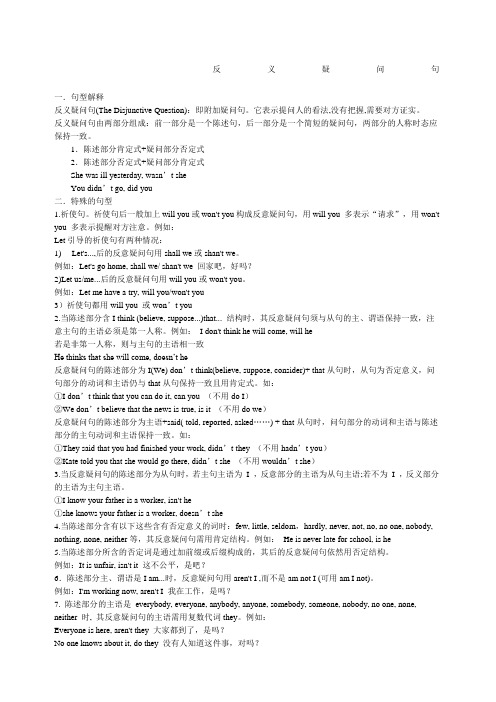
反义疑问句一.句型解释反义疑问句(The Disjunctive Question):即附加疑问句。
它表示提问人的看法,没有把握,需要对方证实。
反义疑问句由两部分组成:前一部分是一个陈述句,后一部分是一个简短的疑问句,两部分的人称时态应保持一致。
1.陈述部分肯定式+疑问部分否定式2.陈述部分否定式+疑问部分肯定式She was ill yesterday, wasn’t sheYou didn’t go, did you二.特殊的句型1.祈使句。
祈使句后一般加上will you或won't you构成反意疑问句,用will you 多表示“请求”,用won't you 多表示提醒对方注意。
例如:Let引导的祈使句有两种情况:1) Let's...,后的反意疑问句用shall we或shan't we。
例如:Let's go home, shall we/ shan't we 回家吧,好吗?2)Let us/me...后的反意疑问句用will you或won't you。
例如:Let me have a try, will you/won't you3)祈使句都用will you 或won’t you2.当陈述部分含I think (believe, suppose...)that... 结构时,其反意疑问句须与从句的主、谓语保持一致,注意主句的主语必须是第一人称。
例如:I don't think he will come, will he若是非第一人称,则与主句的主语相一致He thinks that she will come, doesn’t he反意疑问句的陈述部分为I(We) don’t think(believe, suppose, consider)+ that从句时,从句为否定意义,问句部分的动词和主语仍与that从句保持一致且用肯定式。
(完整)反义疑问句讲解和练习(答案)
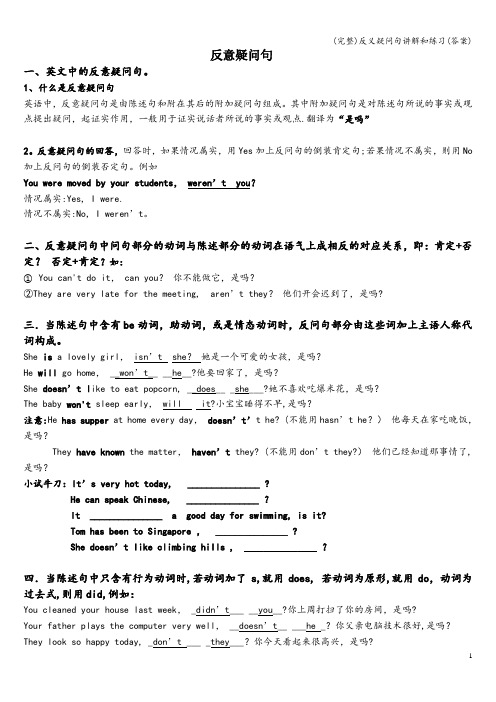
反意疑问句一、英文中的反意疑问句。
1、什么是反意疑问句英语中,反意疑问句是由陈述句和附在其后的附加疑问句组成。
其中附加疑问句是对陈述句所说的事实或观点提出疑问,起证实作用,一般用于证实说话者所说的事实或观点.翻译为“是吗”2。
反意疑问句的回答,回答时,如果情况属实,用Yes加上反问句的倒装肯定句;若果情况不属实,则用No 加上反问句的倒装否定句。
例如You were moved by your students,weren’t you?情况属实:Yes, I were.情况不属实:No, I weren’t。
二、反意疑问句中问句部分的动词与陈述部分的动词在语气上成相反的对应关系,即:肯定+否定?否定+肯定?如:①You can't do it, can you?你不能做它,是吗?②They are very late for the meeting, aren’t they?他们开会迟到了,是吗?三.当陈述句中含有be动词,助动词,或是情态动词时,反问句部分由这些词加上主语人称代词构成。
She is a lovely girl,isn’t she?她是一个可爱的女孩,是吗?He will go home, __won’t__ __he__?他要回家了,是吗?She doesn’t l ike to eat popcorn, __does__ _she___?她不喜欢吃爆米花,是吗?The baby won't sleep early, will it?小宝宝睡得不早,是吗?注意:He has supper at home every day,doesn’t’t he? (不能用hasn’t he?)他每天在家吃晚饭,是吗?They have known the matter,haven’t they? (不能用don’t they?)他们已经知道那事情了,是吗?小试牛刀:It’s very hot today, _______________ ?He can speak Chinese, _______________ ?It _______________ a good day for swimming, is it?Tom has been to Singapore , _______________ ?She do esn’t like climbing hills , _______________ ?四.当陈述句中只含有行为动词时,若动词加了s,就用does, 若动词为原形,就用do,动词为过去式,则用did,例如:You cleaned your house last week, _didn’t___ __you__?你上周打扫了你的房间,是吗?Your father plays the computer very well, __doesn’t__ ___he _?你父亲电脑技术很好,是吗?They look so happy today, _don’t ___ _they___?你今天看起来很高兴,是吗?小试牛刀: Meimei studies in a middle school, _______________ ?He loves cold weather , _______________ ?You finished the task yesterday, _______________ ?五.反意疑问句的陈述部分带有little, few, never, hardly, seldom,nobody, nothing,barely, scarcely等否定意义的词时,问句部分用肯定式.如:①She never tells a lie, does she?(不用doesn’t she?)她从不说谎,是吗?②He was seldom late, was he?(不用wasn’t he?) 他几乎不迟到,是吗?小试牛刀:Few students can answer the question, _______________ ?He can hardly finish his homework, _______________ ?六、反意疑问句的陈述部分为I am……时,问句部分习惯上用aren’t I?表示.如:I am a very honest man, aren’t I? 我是个很诚实的人,是吗?小试牛刀:I’m in Class 3,Grade 2, _______________ ?I’m ten years old, _______________ ?七.陈述部分的主语为不定代词something, anything, nothing, everything时,问句部分的主语用it。
中考英语反义疑问句讲解及习题!
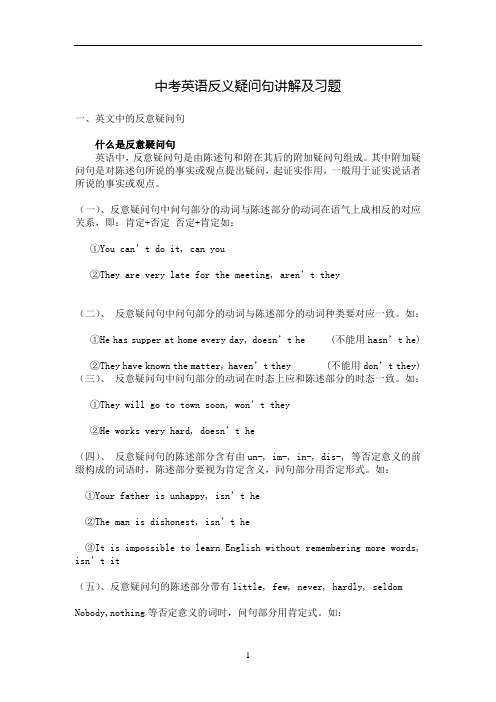
中考英语反义疑问句讲解及习题一、英文中的反意疑问句什么是反意疑问句英语中,反意疑问句是由陈述句和附在其后的附加疑问句组成。
其中附加疑问句是对陈述句所说的事实或观点提出疑问,起证实作用,一般用于证实说话者所说的事实或观点。
(一)、反意疑问句中问句部分的动词与陈述部分的动词在语气上成相反的对应关系,即:肯定+否定否定+肯定如:①You can’t do it, can you②They are very late for the meeting, aren’t th ey(二)、反意疑问句中问句部分的动词与陈述部分的动词种类要对应一致。
如:①He has supper at home every day, doesn’t he (不能用hasn’t he)②They have known the matter, haven’t they (不能用don’t they) (三)、反意疑问句中问句部分的动词在时态上应和陈述部分的时态一致。
如:①They will go to town soon, won’t they②He works very hard, doesn’t he(四)、反意疑问句的陈述部分含有由un-, im-, in-, dis-, 等否定意义的前缀构成的词语时,陈述部分要视为肯定含义,问句部分用否定形式。
如:①Your father is unhappy, isn’t he②The man is dishonest, isn’t he③It is impossible to learn English without remembering more words, isn’t it(五)、反意疑问句的陈述部分带有little, few, never, hardly, seldomNobody,nothing等否定意义的词时,问句部分用肯定式。
如:①She never tells a lie, does she (不用doesn’t she)②He was s eldom late, was he (不用wasn’t he)(六)、反意疑问句的陈述部分为I am……时,问句部分习惯上用aren’t I 表示。
高中英语反义疑问句练习题及讲解
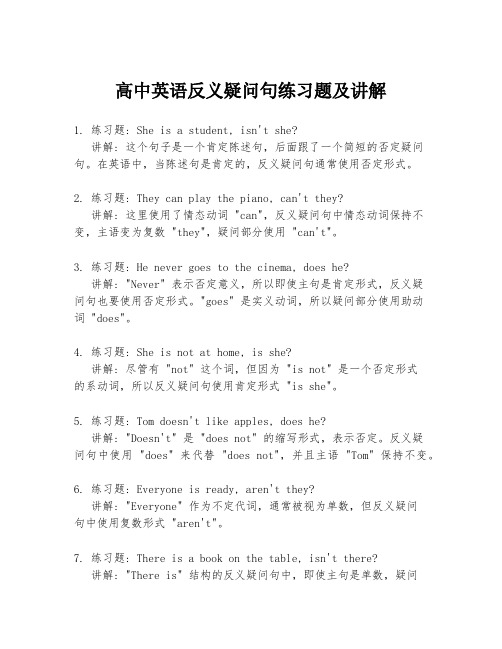
高中英语反义疑问句练习题及讲解1. 练习题: She is a student, isn't she?讲解: 这个句子是一个肯定陈述句,后面跟了一个简短的否定疑问句。
在英语中,当陈述句是肯定的,反义疑问句通常使用否定形式。
2. 练习题: They can play the piano, can't they?讲解: 这里使用了情态动词 "can",反义疑问句中情态动词保持不变,主语变为复数 "they",疑问部分使用 "can't"。
3. 练习题: He never goes to the cinema, does he?讲解: "Never" 表示否定意义,所以即使主句是肯定形式,反义疑问句也要使用否定形式。
"goes" 是实义动词,所以疑问部分使用助动词 "does"。
4. 练习题: She is not at home, is she?讲解: 尽管有 "not" 这个词,但因为 "is not" 是一个否定形式的系动词,所以反义疑问句使用肯定形式 "is she"。
5. 练习题: Tom doesn't like apples, does he?讲解: "Doesn't" 是 "does not" 的缩写形式,表示否定。
反义疑问句中使用 "does" 来代替 "does not",并且主语 "Tom" 保持不变。
6. 练习题: Everyone is ready, aren't they?讲解: "Everyone" 作为不定代词,通常被视为单数,但反义疑问句中使用复数形式 "aren't"。
英语反意疑问句讲解和练习(有答案)

英语反意疑问句讲解和练习(有答案)一、英文中的反意疑问句。
1、什么是反意疑问句英语中,反意疑问句是由陈述句和附在其后的附加疑问句组成。
其中附加疑问句是对陈述句所说的事实或观点提出疑问,起证实作用,一般用于证实说话者所说的事实或观点。
翻译为“是吗”2.反意疑问句的回答,回答时,如果情况属实,用Yes加上反问句的倒装肯定句;若果情况不属实,则用No加上反问句的倒装否定句。
例如You were moved by your students, weren’t you?情况属实:Yes, I were.情况不属实:No, I weren’t.二、反意疑问句中问句部分的动词与陈述部分的动词在语气上成相反的对应关系,即:肯定+否定?否定+肯定?如:①You can’t do it, can you? 你不能做它,是吗?②They are very late for the meeting, aren’t they? 他们开会迟到了,是吗?三.当陈述句中含有be动词,助动词,或是情态动词时,反问句部分由这些词加上主语人称代词构成。
She is a lovely girl, isn’t she? 她是一个可爱的女孩,是吗?He will go home, __won’t__ __he__?他要回家了,是吗?She doesn’t like to eat popcorn, __does__ _she___?她不喜欢吃爆米花,是吗?The baby won’t sleep early, will it?小宝宝睡得不早,是吗?注意:He has supper at home every day, doesn’t’t he? (不能用hasn’t he?) 他每天在家吃晚饭,是吗?They have known the matter, haven’t they? (不能用don’t they?) 他们已经知道那事情了,是吗?小试牛刀:It’s very hot today, _______________ ?He can speak Chinese, _______________ ?It _______________ a good day for swimming, is it?Tom has been to Singapore , _______________ ?She doesn’t like climbing hills , _______________ ?四.当陈述句中只含有行为动词时,若动词加了s,就用does, 若动词为原形,就用do,动词为过去式,则用did,例如:You cleaned your house last week, _didn’t___ __you__?你上周打扫了你的房间,是吗?Your father plays the computer very well, __doesn’t__ ___he _?你父亲电脑技术很好,是吗?They look so happy today, _don’t ___ _they___?你今天看起来很高兴,是吗?小试牛刀:Meimei studies in a middle school, _______________ ?He loves cold weather , _______________ ?You finished the task yesterday, _______________ ?五.反意疑问句的陈述部分带有little, few, never, hardly, seldom,nobody, nothing, barely, scarcely等否定意义的词时,问句部分用肯定式。
反义疑问句详解及练习题(带答案)

反义疑问句的用法1.定义:反义疑问句,表示说话人提出看法、建议或意见,问对方同意与否。
2.结构:有两部分组成,前一部分为陈述形式,后一部分为疑问句。
3.形式:前肯后否与前否后肯。
Lucy isn“t beautiful, is she?露西不幽美,是吗?Li Ming is pretty handsome, isn“t he?黎明相当帅,不是吗?4.回答:肯定回答:“Yes+肯定结构”,否定回答“No+否定结构”,但是注意“Yes”要译为“不”,“No”要译为“是”。
-Your sister is a teacher, isn“t she?你妹妹是老师,不是吗?-Yes, she is.不,她是老师。
-You can play the guitar, can“t you?你会弹吉他,不是吗?-No, I can“t.是的,我不会。
特别注意:1)当陈述部分为否定式,反意疑问句为肯定式时,其回答往往与汉语不一致“It isn’t cheap, is it?“ “Yes, it is.““它不省钱吧?”“不,很省钱。
”“He doesn’t love her, does he?“ “No, he doesn’t.““他不爱她,是吗?”“是的,他不爱她。
”此时,“Yes“即不,对前面“It isn“t cheap.“的否定。
否定反意疑问句的回答当陈述部分为肯定式,反意疑问句为否定式时,其回答大凡不会造成困难,大凡只需照情况回答即可:“It’s new, isn’t it?“ “Yes, it is.““是新的,对吗?”“对,是新的。
”“H e wants to go, doesn’t he?“ “No, he doesn’t.““他想去,对吗?”“不,他不想去。
”此时,“Yes“即是,对前面“It“s new.“的肯定。
2)像disagree,dislike,unhappy这类带有否定前缀后缀的单词,用在句中时,句子仍然视为肯定句,而其反意疑问句采用否定结构如:He disagreed with you, didn“t he?She is unhappy now,isn“t she?5.反义疑问句的类型:(1)、be型eg: The weather is fine, isn“t it?天气很好,不是吗?The dress isn“t blue, is it?那件裙子不是蓝色的,是吗?(2)、助动词型Tom has a basketball, doesn“t he?汤姆有一个篮球,不是吗?Your father often doesn“t get up at six thirty, does he?你爸爸通常不在六点半起床,是吗?You want to be an artist when you grow up, don“t you?当你长大后你想当一名艺术家,不是吗?All the students don“t like wearing the school uniform, do they?所有的学生都不喜欢在学校穿校服,是吗?(3)、情态动词型You will go to Beijing, won“t you?你将去北京,不是吗?My son can“t work out this question, can he?我儿子不会做这道题,是吗?随堂练习1. Linda ate nothing this morning, ___?A. didn’tsheB. was sheC. did sheD. wasn’t she2. There’s hardly___ milk in the bottle, _____there?A. no, isn’tB. some, isC. little, isn’tD. any, is3. He has never ridden a horse before, ___?A. does heB. has heC. hasn’t heD. doesn’t he4.—He seldom came here, _____?—Yes sir.A. didn’t heB. does heC. doesn’t heD. did he5. Everything seems all right, _____ ?A. does itB. don’t theyC. won’t itD. doesn’t it6. One can’t be too modest, can _____ ?A. oneB. heC. itD. we7. No one failed in the exam, _____ ?A. was heB. did oneC. did theyD. didn’t he8. Neither you nor I am an artist, _____ ?A. am IB. aren’t weC. are weD. ain’t I9. He can’t be her father, _____ he?A. isB. isn’tC. canD. can t’10. They have no time to visit the museum, _____?A. do theyB. haven’t theyC. don’t theyD. will they11. You’d better go at once, _____ you?A. hadn’tB. didC. didn’tD. don’t12. You’d rather work than play, _____ you?A. hadn’tB. wouldn’tC. didn’tD. mustn’t13. You dare not do that, _____ you?A. don’tB. doC. dareD. daren’t14. He dislikes the two subjects, _____ he?A. doesB. doesn’tC. isD. isn’t15. These tools are useless now, _____ ?A. are theyB. aren’t theyC. is itD. isn’t it16. He used to get up at 6:30, _____ he?A.didn’t heB. did heC. used heD. wouldn’t he17. He ought to win the first prize, _______ he?A. mustn’tB. oughtn’tC. shouldn’tD. Both B and C.18. Let’s go there by bus, ___?A. will youB. shall weC. don’t youD. will you19. Let us go to play football, ___?A. will youB. shall weC. do weD. are we20. Don’t forget to give Polly some food and change her water, ___?A. will youB. shall weC. won’t youD. do you典题精析. 1-5 CDBDD 6-10 ACCAA 11-15 ABCBB 16-20 ADBAA。
反义疑问句用法及练习题(附答案)

反义疑问句用法及练习题(附答案)反意疑问句用法及练习反意疑问句是指提出情况或者看法,询问对方同意不同意。
这种问句由两部分组成,前一部分是陈述句的形式,后一部分是附着在前一部分上的简短问句,前后两部分要构成反意疑问关系。
又分为两种情况:(1)前一部分为肯定形式,后一部分要为否定形式,即“前肯后否”的形式;或(2)前一部分为否定形式,后一部分则为肯定形式,即“前否后肯”的形式。
具体句式如下:1.0 前肯后否He is a pupil, isn’t he?You are a teacher, aren’t you?We are here, aren’t we?He likes English, doesn’t he?You like English, don’t you?They like English, don’t they?We shall go to the cinema, shan’t we?2.0 前否后肯He isn’t a pupil, is he?You aren’t a teacher, are you?They won’t go to the park tomorrow, will they?I am not a teacher, am I?You haven’t done your homework, have you?3.0陈述部分主、谓语是I am…时,3.1陈述句为肯定句时,反意疑问句用aren't I 或ain't I, 而不是am not I (可用am I not),例如:I'm as tall as your sister, aren't I?I am a doctor, aren’t I?或I am a doctor, ain't I? (慎用)反意问句为否定式时通常要缩写(若不缩写则用较正式的am I not),而am not在标准英语中又没有相应的缩写式,所以人们便用aren’t 来代之。
中考英语反义疑问句讲解及练习题
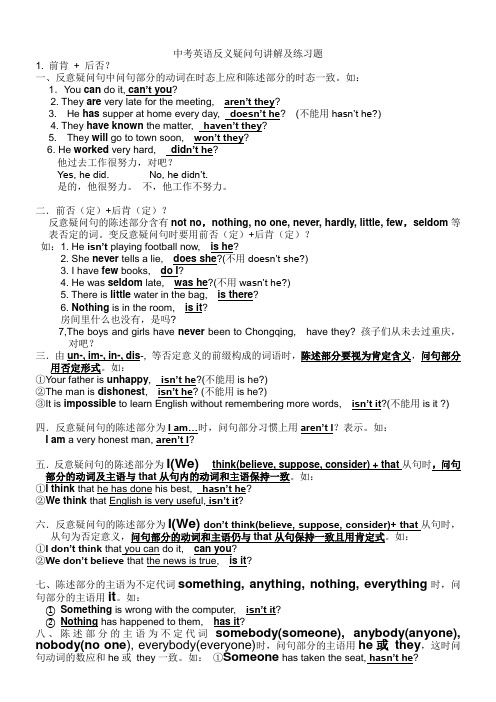
中考英语反义疑问句讲解及练习题1. 前肯+ 后否?一、反意疑问句中问句部分的动词在时态上应和陈述部分的时态一致。
如:1.You can do it, can’t you?2. They are very late for the meeting, aren’t they?3. He has supper at home every day, doesn’t he? (不能用hasn’t he?)4. They have known the matter, haven’t they?5. They will go to town soon, won’t they?6. He worked very hard, did n’t he?他过去工作很努力,对吧?Yes, he did. No, he didn’t.是的,他很努力。
不,他工作不努力。
二.前否(定)+后肯(定)?反意疑问句的陈述部分含有not no,nothing, no one, never, hardly, little, few,seldom等表否定的词。
变反意疑问句时要用前否(定)+后肯(定)?如:1. He isn’t playing football now, is he?2. She never tells a lie, does she?(不用doesn’t she?)3. I have few books, do I?4. He was seldom late, was he?(不用wasn’t he?)5. There is little water in the bag, is there?6. Nothing is in the room, is it?房间里什么也没有,是吗?7,The boys and girls have never been to Chongqing, have they? 孩子们从未去过重庆,对吧?三.由un-, im-, in-, dis-, 等否定意义的前缀构成的词语时,陈述部分要视为肯定含义,问句部分用否定形式。
(完整版)反义疑问句的用法归纳及习题

(完整版)反义疑问句的⽤法归纳及习题反意疑问句【反意疑问句】(⼀)概念:反意疑问句是由陈述句和附在其后的附加疑问句组成。
其中附加疑问句是对陈述句所说的事实或观点提出疑问,起证实作⽤,⼀般⽤于证实说话者所说的事实或观点。
(⼆)要点注意:1、反意疑问句前后两部分谓语应是:“肯定陈述+否定疑问”或“否定陈述+肯定疑问”。
2、简略问句如果是否定式:not应与be,do,will等系动词、助动词、情态动词缩写。
3、简略问句的主语不⽤名词,应⽤⼈称代词。
4、陈述部分含“too...to”时,是否定句。
(三)⽤法:1) 陈述部分I am时,疑问部分要⽤aren't I.I'm as tall as your sister,aren't I?(我和你姐姐⼀样⾼,对吗?)2) 陈述部分⽤no, nothing, nobody, never, few, little, seldom, rarely,hardly等否定含义的词时,疑问部分⽤肯定含义。
如:The old man made no answer, did he?Jim is never late for school, is he?3) 陈述部分有情态动词have to +v. (had to + v.),疑问部分常⽤don't +主语(didn't +主语)。
We have to get there at eight tomorrow, don't we?used to,疑问部分⽤didn't +主语或usedn't +主语。
He used to take pictures there, didn't he? / usedn't he?had better(最好)+ v. 疑问句部分⽤hadn't you?You'd better read it by yourself, hadn't you?4) 陈述部分有would rather(宁可、宁愿)+v.,疑问部分多⽤wouldn't +主语。
高中英语语法:反义疑问句专项讲解(含答案)
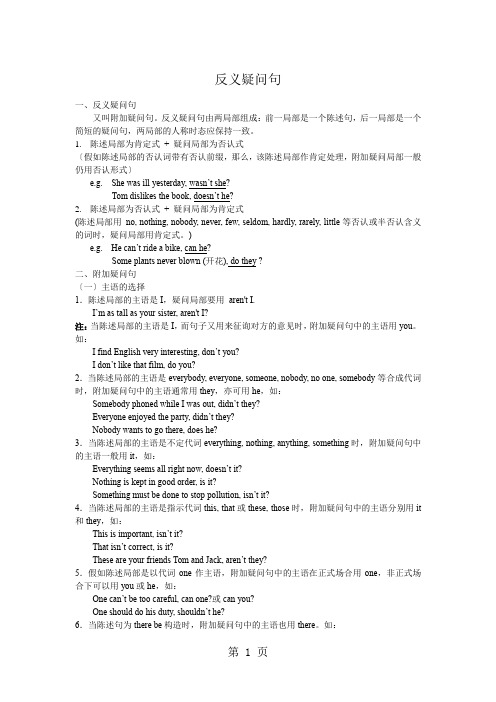
反义疑问句一、反义疑问句又叫附加疑问句。
反义疑问句由两局部组成:前一局部是一个陈述句,后一局部是一个简短的疑问句,两局部的人称时态应保持一致。
1.陈述局部为肯定式+ 疑问局部为否认式〔假如陈述局部的否认词带有否认前缀,那么,该陈述局部作肯定处理,附加疑问局部一般仍用否认形式〕e.g. She was ill yesterday, wasn’t she?Tom dislikes the book, doesn’t he?2.陈述局部为否认式+ 疑问局部为肯定式(陈述局部用no, nothing, nobody, never, few, seldom, hardly, rarely, little等否认或半否认含义的词时,疑问局部用肯定式。
)e.g. He can’t ride a bike, can he?Some plants never blown (开花), do they ?二、附加疑问句〔一〕主语的选择1.陈述局部的主语是I,疑问局部要用aren't I.I’m as tall as your sister, aren't I?注:当陈述局部的主语是I,而句子又用来征询对方的意见时,附加疑问句中的主语用you。
如:I find English very interesting, don’t you?I don’t like that film, do you?2.当陈述局部的主语是everybody, everyone, someone, nobody, no one, somebody等合成代词时,附加疑问句中的主语通常用they,亦可用he,如:Somebody phoned while I was out, didn’t they?Everyone enjoyed the party, didn’t they?Nobody wants to go there, does he?3.当陈述局部的主语是不定代词everything, nothing, anything, something时,附加疑问句中的主语一般用it,如:Everything seems all right now, doesn’t it?Nothing is kept in good order, is it?Something must be done to stop pollution, isn’t it?4.当陈述局部的主语是指示代词this, that或these, those时,附加疑问句中的主语分别用it 和they,如:This is important, isn’t it?That isn’t correct, is it?These are your friends Tom and Jack, aren’t they?5.假如陈述局部是以代词one作主语,附加疑问句中的主语在正式场合用one,非正式场合下可以用you或he,如:One can’t be too careful, can one?或can you?One should do his duty, shouldn’t he?6.当陈述句为there be构造时,附加疑问句中的主语也用there。
(2021年整理)英语反义疑问句讲解及练习题2

英语反义疑问句讲解及练习题2编辑整理:尊敬的读者朋友们:这里是精品文档编辑中心,本文档内容是由我和我的同事精心编辑整理后发布的,发布之前我们对文中内容进行仔细校对,但是难免会有疏漏的地方,但是任然希望(英语反义疑问句讲解及练习题2)的内容能够给您的工作和学习带来便利。
同时也真诚的希望收到您的建议和反馈,这将是我们进步的源泉,前进的动力。
本文可编辑可修改,如果觉得对您有帮助请收藏以便随时查阅,最后祝您生活愉快业绩进步,以下为英语反义疑问句讲解及练习题2的全部内容。
反意疑问句讲解1。
前肯(定)+后否(定)?一、反意疑问句中问句部分的动词在时态上应和陈述部分的时态一致。
如: 1。
You can do it, can’t you?2.They are very late for the meeting,aren't they?3.He has supper at home every day,doesn’t he? (不能用hasn’t he?)4。
They have known the matter, haven’t they?5。
They will go to town soon, won’t they?6.He worked very hard, did n’t he?他过去工作很努力,对吧?Yes, he did。
No, he didn’t。
是的,他很努力。
不,他工作不努力.二.前否(定)+后肯(定)?反意疑问句的陈述部分含有not no,nothing,no one, never, hardly, little, few,seldom等表否定的词.变反意疑问句时要用前否(定)+后肯(定)?如:1。
He isn’t playing football now, is he?2.She never tells a lie,does she?(不用doesn’t she?)3。
I have few books, do I?4, He was seldom late, was he?(不用wasn't he?)5。
- 1、下载文档前请自行甄别文档内容的完整性,平台不提供额外的编辑、内容补充、找答案等附加服务。
- 2、"仅部分预览"的文档,不可在线预览部分如存在完整性等问题,可反馈申请退款(可完整预览的文档不适用该条件!)。
- 3、如文档侵犯您的权益,请联系客服反馈,我们会尽快为您处理(人工客服工作时间:9:00-18:30)。
反意疑问句讲解1. 前肯(定)+后否(定)?一、反意疑问句中问句部分的动词在时态上应和陈述部分的时态一致。
如:1。
You can do it, can’t you?2.They are very late for the meeting, aren’t they?3.He has supper at home every day, doesn’t he? (不能用hasn’t he?)4.They have known the matter, haven’t they?5.They wi ll go to town soon, won’t they?6.He worked very hard, did n’t he?他过去工作很努力,对吧?Yes, he did. No, he didn’t.是的,他很努力。
不,他工作不努力。
二.前否(定)+后肯(定)?反意疑问句的陈述部分含有not no,nothing,no one, never, hardly, little, few,seldom等表否定的词。
变反意疑问句时要用前否(定)+后肯(定)?如:1.He isn’t playing football now, is he?2.She never tells a lie, does she?(不用doesn’t she?)3.I have few books, do I?4, He was seldom late, was he?(不用wasn’t he?)5.There is little water in the bag, is there?6.Nothing is in the room, is it?房间里什么也没有,是吗?7,The boys and girls have never been to Chongqing,have they? 孩子们从未去过重庆,对吧?三.由un-, im-, in-, dis-, 等否定意义的前缀构成的词语时,陈述部分要视为肯定含义,问句部分用否定形式。
如:①Your father is unhappy, isn’t he?(不能用is he?)②The man is dishonest, isn’t he? (不能用is he?)③It is impossible to learn English without rememberingmore words, isn’t it?(不能用is it ?)四.反意疑问句的陈述部分为I am…时,问句部分习惯上用aren’t I?表示。
如:I am a very honest man, aren’t I?五.反意疑问句的陈述部分为I(We) think(believe, suppose, guess ,consider) + that从句时,问句部分的动词及主语与that从句内的动词和主语保持一致。
如:①I think that he has done his best, hasn’t he?②We think that English is very useful, isn’t it? (不用don’twe?)八.反意疑问句的陈述部分为I(We) don’t think(believe, guess ,suppose, consider)+ that从句时,从句为否定意义,问句部分的动词和主语仍与that从句保持一致且用肯定式。
如:①I don’t thi nk that you can do it, can you? (不用do I?)②We don’t believe that the news is true, is it? (不用dowe?)九.反意疑问句的陈述部分为非第一人称主语+ think(believe, suppose, consider) + that从句时,问句部分的动词和主语与陈述部分的主句动词和主语保持一致。
如:①They all think that English is very important, don’t they? (不用isn’t it?)②He didn’t think that the news was true, did he? (不用wasn’t/ was it?)十、反意疑问句的陈述部分为主语+said( told, reported,asked……) + that从句时,问句部分的动词和主语与陈述部分的主句动词和主语保持一致。
如:①They said that you had finished your work, didn’t they?(不用hadn’t you)②Kate told you that she would go there, didn’t she? (不用wouldn’t she?)十一、陈述部分的主语为不定代词something, anything, nothing, everything时,问句部分的主语用it。
如:①Something is wrong with the computer, isn’t it?②Nothing has happened to them, has it?十二、陈述部分的主语为不定代词somebody(someone), anybody(anyone), nobody(no one), everybody(everyone)时,问句部分的主语用he或they,这时问句动词的数应和he 或they一致。
如:①Someone has taken the seat, hasn’t he?③Everyone has done their best in the game, haven’tthey?十三。
This is a pen , isn’t it?(不能说isn’t this ?)That is a book,, isn’t it ? (不能说isn’t that ?)These /Those are maps, aren’t they ?(不能说aren’t these /those?)十四、陈述部分为Let us……时,问句部分习惯上用will you?形式。
如:Let us stop to rest, will you?十五、陈述部分为Let’s……时,问句部分习惯上用shall we?形式。
如:Let’s go home together, shall we?十六、陈述部分用上述情况以外的祈使句时,问句部分一般用will you?形式表示请求,用won’t you?形式表示委婉请求或邀请。
如:①Do sit down, won’t you?/ will you?Please open the window, will you?(won’t you?)十七、陈述部分为否定祈使句时,问句部分一般用will you?形式。
如:Don’t make any noise, will you?十八、陈述部分为There (Here) + be + 主语时,问句部分用动词+there(here)?形式。
如:①There are two cakes on the plate, aren’t there?②Here is a story about Mark Twain, isn’t here?十九、陈述部分用had better +原形动词表示建议时,问句部分用hadn’t +主语?形式。
①You’d better tell him about the matter, hadn’t you?②We had better do it by ourselves, hadn’t we?二十、陈述部分用used to +主语时,问句部分用didn’t + 主语?或usedn’t +主语?形式。
如:①He used to live in the country, didn’t he?/usedn’t he?②They used to be good friends, didn’t they?/usedn’t they? 二十一、陈述部分的主语为动名词或不定式时,问句的主语用it代替。
如:①To do one good deed is easy for a person, isn't it?②Skating is your favorite sport, isn't it?二十二。
反义疑问句的回答1.The door is open now, isn’t it ? Yes ,it is.门现在是开着的,是吗? 是的,是开着的。
2.The girl hasn’t been to Chongqing ,has she ?Yes, she has./ No, she hasn’t.这个女孩没来过重庆,对吗/是吗?不,来过。
/ 是的,没来过3.He has little money, _____ _____?他几乎没钱了,对吗? Yes, _______ _________.不,他有钱。
______,_______ _______ . 是的,他几乎没钱了。
反意疑问句练习题1.The pen is yours, _____ ______?2.Lucy likes English, _____ _______?3.That was n’t a wonderful night, ________ ________?4.Your sister helped him, _______ _______?5.Tony is talking to his mother, ______ _______?6.Your brother can’t swim, _______ ________?6.We have to finish it before the teacher come back, ___ __?7.The workers had to take the first bus, ______ _______?8.Tom has lived here for many years, ______ ______?9.You have never seen the film already, _____ _______?10.He hadn’t finished his homework by nine o’clockyesterday evening, _______ _________?11.My sister had learned the news,______ _____?12.You aren’t a teacher, are you?翻译:Yes, I am. ______ ___________No, I am not. _______ ________13.He never watches TV,_______ _________?14.Very few people under what he said, ______ ______? 16.She doesn’t like the book, does she?翻译:Yes, she does. ______,___________No, she doesn’t. ______ _____________17.You don’t study Chinese, do you?翻译:Yes, we do. ________________No, we don’t. _______________18.Your friends didn’t have a good time without you last summer, did they?19.翻译:Yes, we . _____ _________________No, we _____ _________20. Speak louder, _______ _________?22. Give me a hand, _____ _____?23. Read it slowly, _______ _________?24. Let’s go, _______ ________?25. Let’s have a cup of tea, ______ ______?26. Let us have a rest, ________ _________?27. Let her play the piano, _____ ______?28. Let me sing a song for you, ____ ______?29.I don’t believe he studies harder, _____ ______?30.He never said he was a good student, _______ ________?31.She didn’t go to the park yesterday , ____ _____?32. Few of them hurt themselves in the accident last night,_____ _____?( )1.They cut the trees , _____? (A) don't they(B) didn't they (C) did they (D) do they ( )2. His sister had a bad cough, ________ she?(A) wasn't (B) doesn't (C) hadn't (D) didn't ( )3. John can hardly understand any Chinese, _______ he?(A) can't (B) doesn't (C) can (D) does( )4. Don't smoke in the meeting room, ________?(A) do you (B) will you (C) can you (D) could you ( )5. Lucy, clean the blackboard today, ________?(A) do you (B) did you (C) will you (D) can you ( )6. Miss Cheng will never forget her first visit to Canada, _______? (A) will she (B) won't she(C) isn't she (D) wasn't she( )7. The lady couldn't say a word when she saw the snake, ______? (A) could the lady (B) couldn't the lady(C) could she (D) couldn't she ( )8. Tina is unhappy now, _________?(A) isn't she (B) is she (C) is he (D) did she ( )9. There is some water in that bottle, isn't _________?(A) there (B) it (C) that (D) those( )10. ——Let's go and play football, _______?——That's wonderful.(A) will you (B) do you (C) won't you (D) shall we ( )11. ——The boy has to stay at home to look after his little sister, ________?—— Yes, because his mother has gone shopping.(A) does he (B) is he (C) doesn't he (D) hasn't he ( )12. ——You won't follow his example, will you?——_______, I don't think he is right.(A) No, I won't (B) Yes, I will(C) No, I will (D) Yes, I won't( )13. Nothing is difficult in the world if you put your heart into it, _________?(A) aren't they (B) are they (C) isn't it (D) is it ( )14. Peter hardly had time for concerts at that time, ____?(A) wasn't he (B) was he (C) didn't he (D) did he ( )15. ——It looks like rain, doesn't it?——_________. And I forgot my raincoat.(A) No, it isn't (B) Yes, it is(C) No, it doesn't (D) Yes, it does( )16.Our class teacher Miss Guo, can hardly ride herbicycle to school,_______ _____?A. can sheB. can’t sheC. isn’t sheD. does she ( )17There Tom found a map on the wall, ___ __?A. wasn’t thereB. didn’t heC. didn’t thereD. wasn’t he( )18.I don’t think Tom know s the key to the question, ___?A. do IB. doesn’t heC. will ID. does he( )19.You don’t think our team will win the match,___?A. will youB. won’t youC. don’t youD. do you ( )20.Tim doesn’t think it is a physical change,_____?A. does heB. doesn’t heC. is itD. isn’t it ( )21.Let’s go to the exhibition this afternoon,______?A. will youB. shall weC. do weD. don’t we ( )22.Please stop talking, ________?A. will youB. shall weC. do weD. don’t we ( )23.They have eight classes every day, _______?A. haven’t theyB. have theyC. do they D don’t they( )24.Jane made few mistakes in the exam, ______?A. did sheB. did JaneC. didn’t sheD. didn’t Jane ( )25. They could hardly believe the news, _____?A. couldn’t theyB. could theyC. did theyD. didn’t they( )26. The sick man’s allowed to take a walk in the garden every day,_____?A. is heB. isn’t heC. has heD. h asn’t he。
